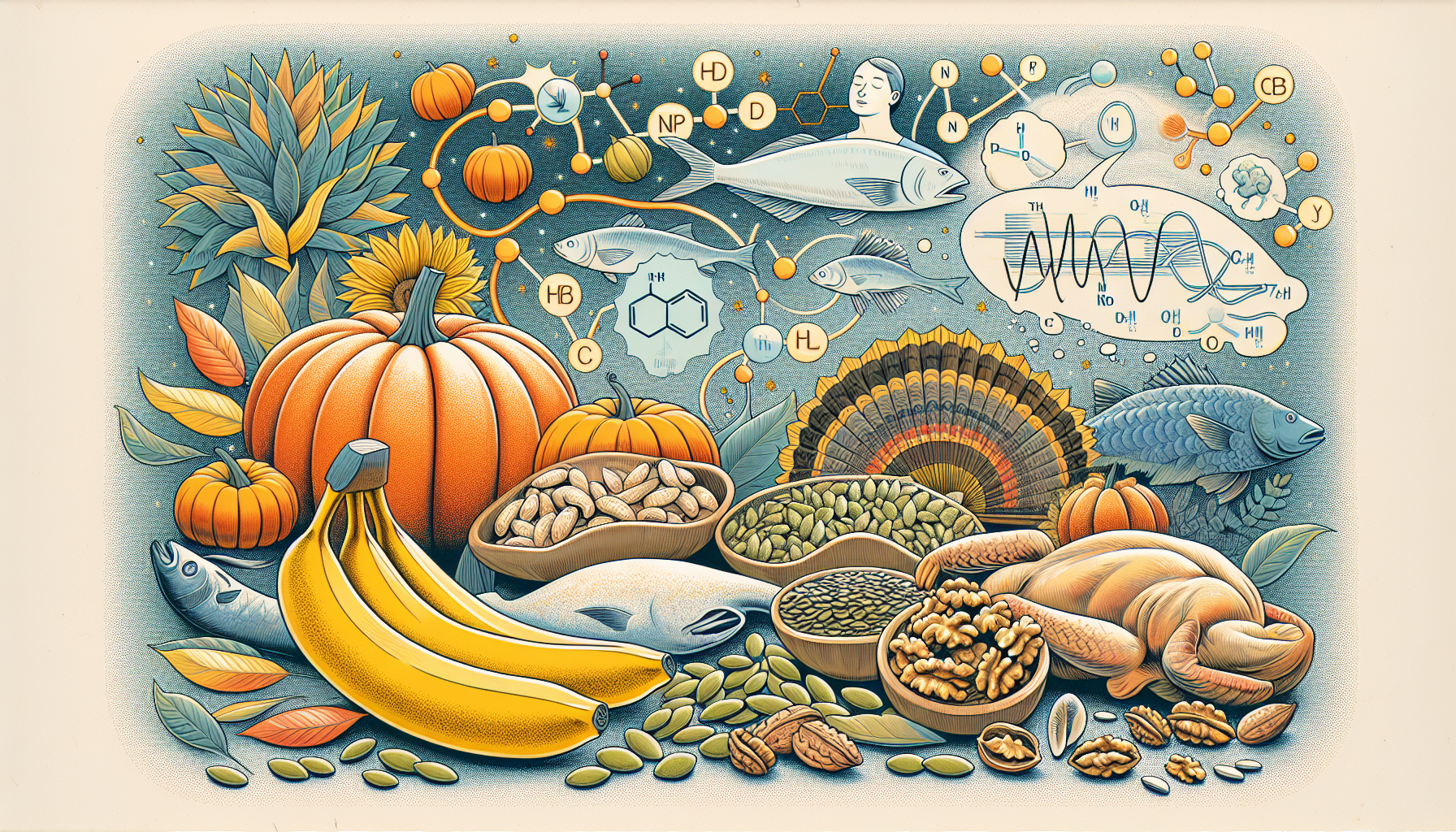
Tryptophan-Rich Foods for Better Sleep: Understanding Their Impact
Key Takeaways
Explore how tryptophan-rich foods can enhance sleep quality by boosting serotonin and melatonin levels. Learn about the best dietary sources and their benefits for sleep health.- Tryptophan is an essential amino acid that aids sleep by converting into serotonin and melatonin, which regulate sleep-wake cycles.
- Dietary sources of tryptophan include poultry, dairy products, meats, seafood, eggs, soy products, legumes, nuts, and seeds.
- Consuming tryptophan-rich foods in combination with carbohydrates can enhance tryptophan's absorption and increase serotonin production.
- Studies suggest that tryptophan supplementation can improve sleep quality, but further research is needed to understand optimal dosages.
- Timing of tryptophan intake is important, with evening consumption potentially improving sleep onset and quality.
- Excessive intake of tryptophan, especially from supplements, can lead to side effects such as agitation, confusion, and gastrointestinal issues.
- Vegetarians and vegans can obtain tryptophan from plant-based sources like nuts, seeds, and legumes to maintain sleep health.
- Meal planning that includes tryptophan-rich foods can be a strategic approach to enhancing sleep quality.
- Natural food sources of tryptophan are generally safer and preferred over supplements due to their complex nutritional composition.
- For individuals with sleep disorders, adequate levels of dietary tryptophan may help alleviate symptoms and improve overall sleep quality.

Fact-Checked
We’ve fact-checked and medically reviewed this article to ensure it meets the standards of our Editorial Policy.

Written by
Sleep Care Pro
The Editorial Team at Sleep Care Pro is dedicated to educating the world on the importance of great sleep by providing expert analysis on Sleep Science, Hygiene and Health.

Reviewed by
Andrew McDowell, PA-C
Andrew McDowell, MMS, PA-C, is an experienced clinician with over 10 years of practice in emergency medicine…
Reading Time: 2 minutes

Understanding Tryptophan
Tryptophan, an essential amino acid, plays a pivotal role in sleep regulation due to its involvement in the biosynthesis of several critical neurochemicals. As a building block for protein synthesis, tryptophan is converted into serotonin, a neurotransmitter that impacts mood and sleep. Subsequently, serotonin can be further metabolized into melatonin, the hormone that regulates sleep-wake cycles.
Since the body cannot synthesize tryptophan on its own, it must be obtained through diet. Foods rich in tryptophan include poultry like turkey and chicken, seafood such as tuna, dairy products like milk and cheese, as well as plant-based options including nuts and seeds. The availability of tryptophan is largely dependent on dietary intake from these high-protein sources.
Research has shown that tryptophan consumption may have additional health benefits beyond improving sleep quality. It aids cognitive function by supporting memory and learning processes and plays a role in maintaining gut-brain homeostasis. Furthermore, by promoting serotonin production, tryptophan can also help alleviate stress and anxiety.
Given its crucial functions and the fact that our bodies rely on external sources to obtain it, incorporating a variety of tryptophan-rich foods into one's diet is important for overall health and particularly beneficial for enhancing sleep quality.
The Relationship Between Tryptophan Intake and Serotonin Levels
Tryptophan, an essential amino acid found in various foods, plays a pivotal role in the production of serotonin, a neurotransmitter that significantly impacts sleep. Studies have shown that dietary tryptophan is directly linked to serotonin synthesis. As tryptophan crosses into the brain, it undergoes conversion into 5-hydroxytryptamine (5-HT), also known as serotonin.
Serotonin has diverse physiological functions, including mood regulation and contribution to well-being. It is also a precursor for melatonin, the hormone responsible for regulating sleep-wake cycles. Thus, adequate intake of tryptophan from dietary sources such as milk, tuna, turkey, oats, cheese, nuts, and seeds can influence both serotonin levels and sleep quality.
The gut-brain axis further illustrates the complex relationship between diet and brain function. The brain-gut-microbiome axis suggests that gut microbiota may affect behavior by interacting with dietary tryptophan to influence central nervous system disorders.
Furthermore, research indicates that high-glycaemic index meals can increase plasma levels of tryptophan which may enhance its availability to the brain (MDPI). This supports the idea that not only the amount but also the type of food consumed can affect how much tryptophan reaches the brain.
In summary, maintaining sufficient levels of dietary tryptophan is important for supporting serotonergic activity which in turn can positively impact sleep quality due to increased melatonin synthesis.
List of Tryptophan-Rich Foods
Incorporating tryptophan-rich foods into your diet may be beneficial for enhancing sleep quality due to the amino acid's role in serotonin production. Here is a curated list of foods known for their high tryptophan content:
- Poultry: Chicken and turkey are excellent sources, with chicken breast often cited as one of the foods with the highest levels of tryptophan.
- Dairy Products: Milk and cheese provide a good amount of this essential amino acid.
- Meats: Red meats, including beef and pork, contain significant levels of tryptophan.
- Seafood: Various types of fish are rich in tryptophan.
- Eggs: Both whole eggs and egg whites offer a quick boost of tryptophan.
- Soy Products: Including tofu, soybeans, edamame, tempeh, which are particularly important for those following a plant-based diet.
- Legumes: Lentils, beans, chickpeas, and peanuts are not only high in protein but also provide this sleep-promoting amino acid.
- Nuts and Seeds: Pumpkin seeds, sunflower seeds, chia seeds, and various nuts are not only nutritious but also rich in tryptophan.
- Whole Grains: Oats and buckwheat can contribute to your daily intake of tryptophan as well as providing other health benefits.
The recommended dietary intake (RDI) for tryptophan is 4mg per kilogram of body weight. For example, an individual weighing 70kg (~154 pounds) should aim for approximately 280mg of tryptophan per day to meet their needs. Incorporating these foods into your diet can help you achieve this goal and potentially improve your sleep quality.
Dietary Sources of Tryptophan
Tryptophan is an essential amino acid that plays a crucial role in sleep regulation by serving as a precursor to serotonin, a neurotransmitter associated with sleep and mood. A variety of foods contain significant amounts of tryptophan, making it possible to incorporate this amino acid into one's diet through natural sources.
- Dairy Products: Dairy items such as milk, cheese, and yogurt are excellent sources of tryptophan. For example, whey alpha-lactalbumin found in dairy is particularly rich in this amino acid.
- Poultry and Meats: Chicken and turkey are well-known for their tryptophan content. However, red meats like beef and pork also contribute to the dietary intake of this amino acid.
- Fish: Various types of fish provide tryptophan. Salmon is often highlighted for its health benefits including its tryptophan levels.
- Nuts and Seeds: Almonds, peanuts, pumpkin seeds, sesame seeds, and other nuts and seeds are not only packed with healthy fats but also contain beneficial levels of tryptophan.
- Soy Products: Foods derived from soy such as tofu offer plant-based options rich in tryptophan suitable for vegetarians and vegans alike.
- Legumes: Beans and other legumes can be good sources of tryptophan while also providing fiber and protein.
The recommended daily intake (RDI) for tryptophan is approximately 4mg per kilogram (1.8mg per pound) of body weight according to the World Health Organization (WHO). This means an individual weighing around 70kg (~154 pounds) should aim for about 280mg of tryptophan daily to meet their nutritional needs.
Vegetarian and Vegan Sources of Tryptophan
For those following a vegetarian or vegan diet, incorporating sufficient tryptophan is essential for maintaining optimal sleep health. Tryptophan, an amino acid found in protein-containing foods, is a precursor to serotonin, which in turn can be converted into the sleep-regulating hormone melatonin. Fortunately, several plant-based foods are rich in tryptophan.
- Seaweeds: Varieties such as spirulina, laver, and wakame are not only high in protein but also provide valuable amounts of tryptophan.
- Seeds: Chia seeds, sesame seeds, hemp seeds, pumpkin seeds, and flaxseeds are excellent sources of this amino acid.
- Nuts: Pistachios, peanuts, cashews, and almonds rank high in their tryptophan content per 100 grams.
- Legumes: Beans and lentils are not just packed with minerals like iron; they're also great sources of both protein and tryptophan.
Eating these foods can help vegetarians and vegans meet their daily requirements for tryptophan. In addition to aiding sleep through serotonin production, these foods contribute to overall nutritional balance. It's important to incorporate a variety of these items into one's diet to ensure adequate intake. Studies show that plant-based proteins account for over half the world's dietary protein supplyindicating their vital role in nutrition including sleep-regulating components like tryptophan.
The Science Behind Tryptophan's Impact on Sleep Quality
Emerging research has begun to illuminate the role of tryptophan, an essential amino acid, in promoting better sleep quality. Studies have consistently shown that supplementation with tryptophan at doses of 1 gram or more can lead to a significant improvement in sleep quality, including reductions in sleep latencythe time it takes to fall asleep. Research published by Oxford University Press highlights the potential benefits of tryptophan supplementation for enhancing sleep.
Tryptophan is a precursor to serotonin, a neurotransmitter that is subsequently converted into melatonin, the hormone responsible for regulating sleep-wake cycles. The intake of tryptophan-rich foods or supplements increases the availability of serotonin in the brain, which can then be transformed into melatonin when darkness falls, thereby facilitating onset and maintenance of sleep.
A systematic review and meta-analysis have further corroborated these findings by assessing the effects of L-tryptophan (Trp) on subjective sleepiness and actual measures of sleep efficiency. According to Nutrition Reviews, evidence from various studies suggests that Trp supplementation can indeed aid in improving overall sleep quality.
Moreover, there is an indication that dietary tryptophan may also play a role in metabolic health through its mediation effects on sleep time. This complex interplay hints at broader implications for tryptophan beyond mere improvements in sleep parameters but also potentially influencing metabolic syndrome risks as outlined by PubMed Central.
While further research is needed to fully understand all mechanisms involved and optimal dosages for different populations, current evidence supports the inclusion of tryptophan as part of a strategy aimed at enhancing both the quantity and quality of sleep.
Strategies to Enhance Tryptophan Absorption for Improved Sleep
Understanding how to optimize the absorption of tryptophan, an essential amino acid, is crucial for leveraging its sleep-promoting benefits. Once ingested, tryptophan is converted into serotonin and melatonin, neurotransmitters that play key roles in regulating sleep. Research indicates that dietary intake and absorption of tryptophan are pivotal for its transformation into these bioactive metabolites.
- Protein-rich meals: Including protein in your diet ensures an adequate supply of tryptophan. Foods such as milk, tuna, turkey, oats, cheese, nuts, and seeds are excellent sources.
- Balanced with carbohydrates: Consuming carbohydrates may help increase the brain uptake of tryptophan. Carbs trigger insulin release which clears other amino acids from the bloodstream and allows more tryptophan to reach the brain.
- Tryptophan supplementation: Studies like those found on PubMed have assessed the impact of direct supplementation on sleep quality. Dosages below 1 gram may be sufficient for improving sleep latency and overall quality.
To maximize the benefits of tryptophan-rich foods on sleep quality, it's recommended to consume them with a balanced amount of carbs a few hours before bedtime. This strategy can facilitate better absorption and conversion into serotonin and melatonin. However, it's important to note that excessive consumption could lead to side effects; thus moderation is key.
The Interplay Between Carbohydrates and Tryptophan Absorption
Understanding the relationship between carbohydrate intake and tryptophan absorption is essential for optimizing sleep quality through diet. Tryptophan, an amino acid found in various protein-rich foods, serves as a precursor to serotonin, a neurotransmitter that plays a pivotal role in sleep regulation. The body's ability to absorb tryptophan effectively is influenced by the presence of other amino acids and nutrients, including carbohydrates.
When carbohydrates are consumed, they trigger insulin release, which causes muscles to absorb most amino acids except for tryptophan. This is because tryptophan binds to albumin in the blood, making it less susceptible to insulin-induced muscle uptake. As a result, relative concentrations of tryptophan in the bloodstream increase postprandially when carbohydrates are ingested. This elevated level allows more tryptophan to cross the blood-brain barrier where it can be converted into serotonin.
The synthesis of serotonin from tryptophan within the brain has significant implications for sleep quality. Serotonin itself is a precursor to melatonin, the hormone responsible for regulating sleep-wake cycles. Therefore, consuming carbohydrates alongside dietary sources of tryptophan may enhance this conversion process and potentially improve sleep onset and quality.
However, it's important to consider that not all carbohydrate sources are equal; complex carbohydrates with lower glycemic indices may provide a steadier release of insulin and thus a more favorable condition for tryptophan absorption into the brain over time.
In summary, strategic consumption of carbohydrates can positively impact tryptophan availability in the brain and thereby contribute to better sleep health through increased serotonin production.
Optimal Timing for Tryptophan Consumption to Enhance Sleep
Understanding the best times to consume tryptophan-rich foods can be pivotal in leveraging their sleep-enhancing properties. Tryptophan, an essential amino acid found in various foods, is a precursor to serotonin, which is subsequently converted into melatonin, the hormone that regulates sleep-wake cycles. Studies suggest that timing of tryptophan intake can influence its effectiveness in promoting better sleep.
- Eating tryptophan-rich foods for dinner or as part of a pre-bedtime snack may aid in improving sleep latency and overall sleep quality due to the body's natural circadian rhythm aligning with melatonin production at night.
- Consuming these foods alongside carbohydrates may further enhance the absorption of tryptophan into the brain, as suggested by research on nutrient interactions affecting tryptophan metabolism.
The indirect effect of dietary tryptophan on sleep time has been demonstrated through mediation analyses, indicating that appropriate consumption timing could potentially reduce risks associated with metabolic syndrome by improving sleep (source). However, it's important not to overconsume these foods close to bedtime as digestion processes can interfere with restful sleep.
In conclusion, while individual responses may vary, incorporating tryptophan-rich foods into evening meals or snacks could be beneficial for those seeking to improve their sleep quality. It is advisable for individuals to monitor their own reactions and adjust timings accordingly.
Understanding the Side Effects of High Tryptophan Intake
While tryptophan is an essential amino acid beneficial for sleep and mood regulation, excessive intake can lead to certain side effects. According to scientific literature, tryptophan acts as a precursor for serotonin and melatonin, which are crucial for maintaining healthy sleep cycles. However, when consumed in large amounts, particularly from supplements, it may cause adverse effects.
- Symptoms such as agitation, confusion, diarrhea, and fever have been associated with tryptophan overdose according to Mayo Clinic.
- Other potential side effects include blurred vision, dizziness, drowsiness, fatigue, head twitching, hives, nausea as reported by Drugs.com.
- It's also important to note that excessive exposure to ultraviolet light should be avoided when consuming high levels of tryptophan due to the risk of cataract formation.
Despite these concerns, studies like one found on PubMed Central indicate that higher dietary intake of tryptophan may lower the risk of metabolic syndrome (MetSyn), potentially due to improved sleep quality. Nevertheless, it is advised that individuals consume tryptophan primarily through their diet rather than supplements and always consult healthcare professionals before making significant changes to their dietary habits.
The Role of Tryptophan in Managing Sleep Disorders
Investigations into the relationship between dietary tryptophan and sleep disorders such as insomnia and sleep apnea have revealed intriguing connections. Tryptophan, an essential amino acid, serves as a precursor for serotonin and melatonin production, both of which are critical in regulating the sleep-wake cycle. Studies indicate that adequate levels of tryptophan can alleviate neuroinflammation and promote the clearance of metabolic toxins from the brain, enhancing overall sleep quality.
Conversely, sleep deprivation has been shown to activate tryptophan's degradation through the kynurenine pathway, leading to an accumulation of neurotoxic metabolites that can exacerbate sleep disorders. A systematic review outlined by PubMed highlights that while L-tryptophan supplementation aids sleep, further research is needed to fully understand its impact on specific aspects of sleep quality.
Evidence suggests a potential for dietary tryptophan to mediate conditions like Metabolic Syndrome (MetSyn) through improvements in sleep duration, according to data from the China Health and Nutrition Survey. This mediation could be particularly beneficial for individuals with disordered patterns of sleep who may be at risk for developing or worsening conditions such as MetSyn.
In summary, while mounting evidence supports the beneficial effects of tryptophan-rich diets on general sleep quality, more targeted research is necessary to delineate its therapeutic role in specific sleep disorders like insomnia and obstructive sleep apnea. Such findings could pave the way for dietary interventions as part of a comprehensive approach to managing these conditions.
Incorporating Tryptophan-Rich Foods Into Your Diet
Ensuring adequate intake of the essential amino acid tryptophan can be beneficial for sleep and overall health. Here are some practical tips to incorporate tryptophan-rich foods into your daily diet:
- Diversify protein sources: Include a variety of tryptophan-containing proteins such as poultry, fish, eggs, and dairy products. For instance, turkey and chicken are well-known sources that can easily be added to meals.
- Embrace plant-based options: Vegetarians and vegans can opt for plant-based sources like nuts, seeds, tofu, beans, and lentils. These not only offer tryptophan but also other nutrients essential for health.
- Incorporate into snacks: Snack on foods high in tryptophan throughout the day. Cheese with whole grain crackers or a handful of pumpkin seeds can make a satisfying snack that contributes to your daily intake.
- Balanced meals: Aim to create balanced meals that include carbohydrates which may help facilitate the uptake of tryptophan by the brain. A stir-fry with lean meat or tofu served over brown rice is an example of a balanced meal.
- Moderation is key: While it's important to include these foods in your diet, excessive consumption is not advised due to potential side effects. Stick to recommended serving sizes.
To enhance the sleep-promoting effects of tryptophan, consider timing your intake by having a small, balanced snack that includes a source of this amino acid about an hour before bedtime. This could potentially improve sleep onset latency and overall sleep quality without leading to digestive discomfort during the night.
Meal Planning for Sleep Health
Integrating tryptophan-rich foods into your daily meal plan can be a strategic approach to enhancing sleep quality. Tryptophan, an essential amino acid, is a precursor to serotonin and melatonin, neurotransmitters that regulate sleep. To harness the benefits of tryptophan for better sleep, consider these meal planning tips:
- Include a moderate amount of protein from sources like dairy or fatty fish in your evening meal; these contain tryptophan which can aid in promoting sleepiness.
- Pairing tryptophan-rich proteins with carbohydrates may facilitate the uptake of tryptophan into the brain. Opt for complex carbs like whole grains to increase serotonin production without causing blood sugar spikes.
- Eating a light dinner 2-3 hours before bedtime allows time for digestion and prevents discomfort that could disrupt sleep.
- Incorporate plant-based options such as soymilk and bananas with nut butter, which offer both nutrients conducive to sleep and a healthy dose of tryptophan.
- Avoid heavy meals and alcohol close to bedtime as they can impair sleep quality. Instead, focus on balanced meals that satisfy without overloading your digestive system.
For instance, an ideal dinner might include grilled salmon (rich in omega-3s and vitamin D), quinoa (a complete protein with all essential amino acids including tryptophan), alongside steamed vegetables drizzled with olive oil (for healthy fats). Finish with a dessert of Greek yogurt topped with honey and walnuts to provide calcium, magnesium, and additional tryptophan.
Mindful meal planning focused on timing, balance, and nutrient content can significantly impact your restfulness at night. By choosing foods that support the natural production of sleep-regulating hormones, you set the stage for improved sleep hygiene and overall well-being.
Supplements vs. Natural Sources of Tryptophan
When considering tryptophan intake for improved sleep quality, one can choose between natural food sources and supplements. Consuming tryptophan through a balanced diet offers several advantages. Foods rich in this essential amino acid often come packed with other beneficial nutrients such as additional amino acids, healthy fats, vitamins, and minerals that support overall health.
Research from PubMed Central indicates that dietary tryptophan contributes to various health aspects including sleep regulation, mood stabilization, and even potential therapeutic effects on conditions like depression and anxiety.
On the other hand, L-tryptophan supplements may provide a more concentrated dose of this amino acid which might be beneficial in treating specific conditions such as sleep disorders or severe mood imbalances. However, it's important to consider the potential side effects and risks associated with high intake levels when using supplements.
Natural food sources are generally considered safer due to their complex nutritional composition which aids absorption and minimizes risks. Moreover, they do not usually lead to excessive consumption that could result in negative side effects. When opting for supplements, consulting healthcare professionals is crucial to ensure proper dosage and mitigate any health risks.
In summary, while both natural foods and supplements can increase tryptophan levels in the body potentially improving sleep quality, natural sources are typically preferred for their additional health benefits and lower risk profile compared to supplements.
Related Articles
Frequently Asked Questions
Tryptophan is an essential amino acid that serves as a precursor to serotonin, a neurotransmitter that can be converted into the hormone melatonin. Melatonin plays a crucial role in regulating sleep cycles, suggesting that tryptophan intake can indirectly promote better sleep by influencing melatonin production.
Foods high in tryptophan include turkey, chicken, milk, cheese, yogurt, eggs, fish, tofu, and various nuts and seeds. Incorporating these foods into your diet may help improve sleep quality by boosting the body's production of melatonin.
Tryptophan improves sleep quality by increasing serotonin levels in the brain, which can then be converted into melatonin. Melatonin regulates the sleep-wake cycle, helping to promote a more restful and consistent sleep pattern.
Yes, it is generally safe for most people to increase their tryptophan intake through dietary sources. However, individuals with certain medical conditions or those taking specific medications should consult with a healthcare provider before making significant changes to their diet.









